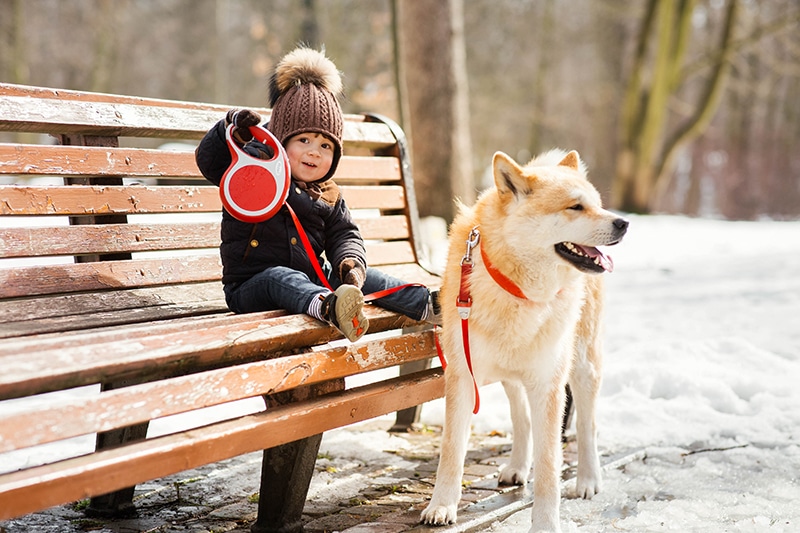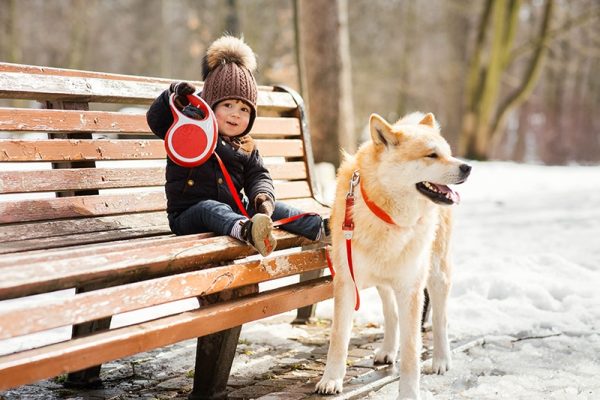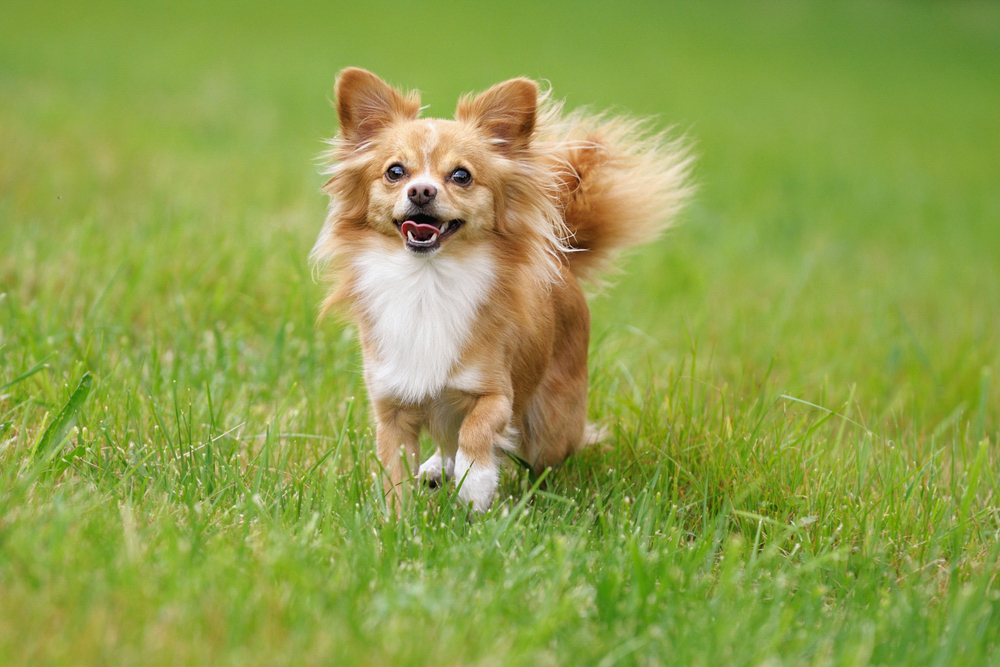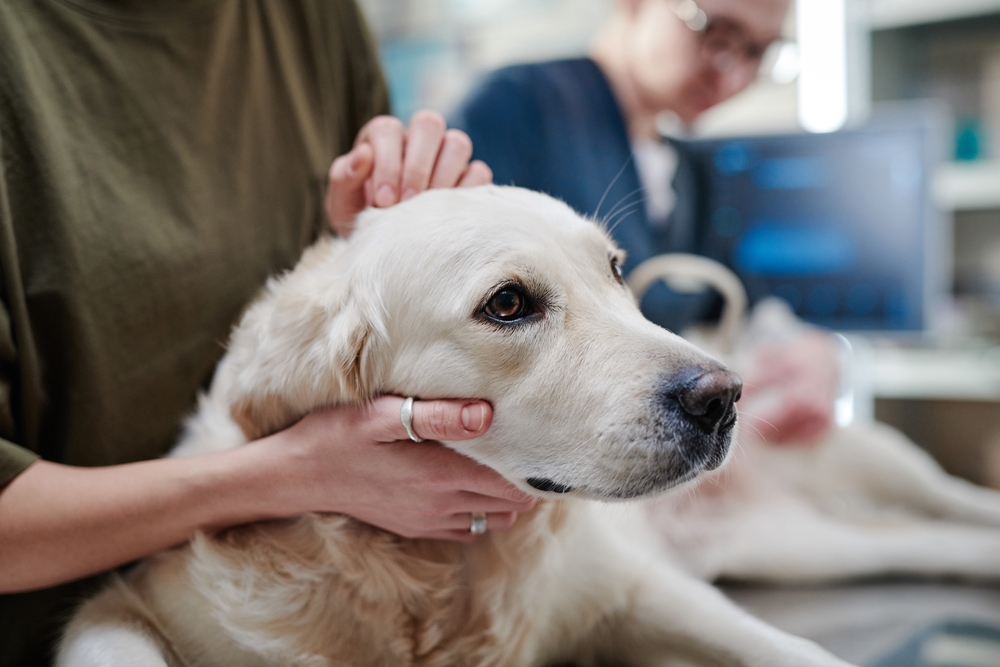Click to Skip Ahead
Akitas are one of the most distinctive large dog breeds, with a regal, alert posture and an unyielding loyalty to their families. The Akita’s muscular stature makes them a force to be reckoned with, and they’re naturally protective of their families. Last but not least, Akitas are very intelligent, trainable dogs, and all these traits together make the Akita a fantastic guard dog.
If you’re interested in learning more about this iconic Japanese breed, you’re in luck. Read below for some history on the Akita as well as some training tips if you’re looking for a tough guard dog.
History of the Akita
The Akita is thought to be one of the most ancient dog breeds, with early records dating them to 200 BC—that’s around the same time the very first Chinese empire was entombing the Terracotta Army! Along with the Shiba and a few other dog breeds, the Akita was used for hunting, personal protection, search and rescue, the military, and companionship.
The most famous Akita of all time and Japan’s favorite dog was named Hachiko, who lived in the early 1900s. Hachiko earned his reputation for devout loyalty by returning to the train station his master took to work every day for up to 9 years after the man passed away. He even has a statue for his loyalty, right in the heart of Tokyo at Shibuya’s subway station plaza.
Sadly, the Akita nearly went extinct in the 20th Century during WWII. Like German breeds in Europe, sustained bombing campaigns killed many Akitas in WWII, and only a handful of purebred Akitas were alive after the war. Many breeders took great interest in the Akita, though the famous Helen Keller was among the first. Keller is said to have visited Japan after the war and became smitten with the breed. She became the first person to bring a pair of Akitas back to the US, and the rest is history.
Today, Akitas are steadfast protectors that become very attached to their families, and they don’t care for strangers at all. Though they take some work, Akitas are an excellent choice for any experienced dog owner.
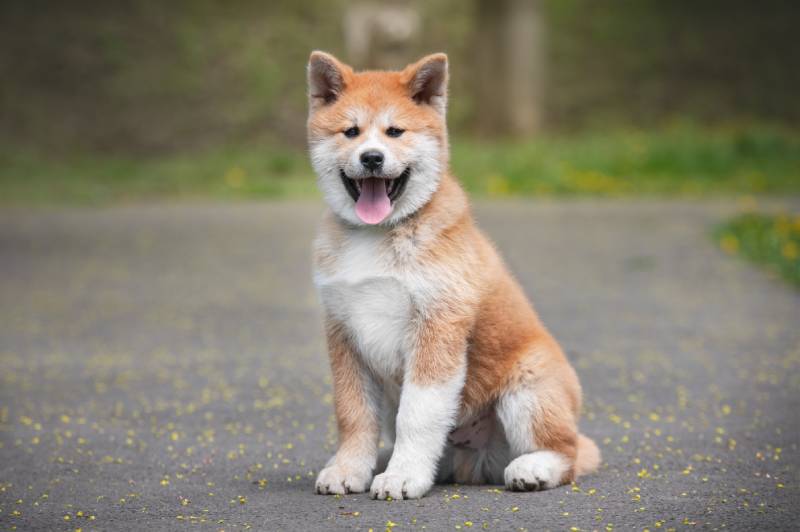
Akita Personality & Temperament
Akitas are quiet and watchful by nature, especially when they’re out and about in public. They’re big and bold, but not especially friendly unless you’re part of the family. With their family, Akitas aren’t scared to let out their goofy, affectionate side, but they can get a little rough with kids. They don’t mean to—they’re just big dogs with big personalities!
It should go without saying that Akitas are confident and fearless but in a quieter and more thoughtful way—they’re not overly excitable pups by nature when fully grown. They’re very active and love nothing more than to go on long, vigorous walks, but they’re happy to sleep at your feet when you get home too. At home, Akitas are the king of the castle and can become very territorial over their dwelling, so they’ll definitely be on the lookout for anything out of the ordinary.
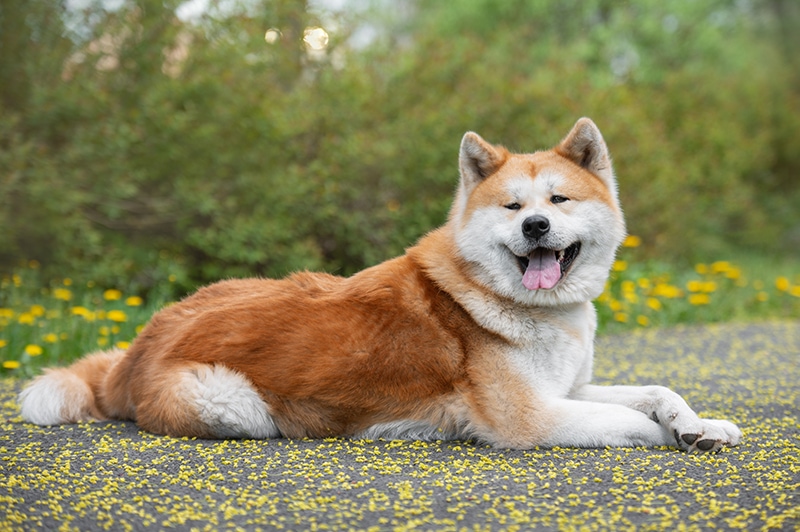

Training & Socializing an Akita
Because they’re very large and have a stubborn streak sometimes, Akitas aren’t recommended for first-time dog owners. They require firm training and plenty of careful socialization from a young age to soften their rough edges. Namely, destructive chewing, barking, leash tugging, and aggression toward animals. Let’s explore how you should go about training and socializing your Akita pup down below.
Training
Training an Akita requires a firm hand and a no-nonsense attitude, which is why we suggest them for experienced dog owners with some idea of how training goes. While being strict with your boundaries is key, don’t overstep and be too harsh with your dog. Akitas are sensitive underneath their tough-guy exterior. For starters, Akitas need leash training so they don’t tug later in life, and obedience training goes hand in hand with that as well.
As with any dog breed, positive reinforcement is a must when training Akitas. Punishment or negative reinforcement will amplify bad behavior, so you want to use plenty of treats for good behavior and ignore the bad. Treats are vital here. Akitas are highly food motivated, and it helps bypass their stubborn habits.
We recommend starting with the basic obedience commands like sit, stay, come, and settle. Those will help keep your dog safe during most situations and even in the event of emergencies. You definitely don’t want your Akita running away if your house catches on fire, for instance.
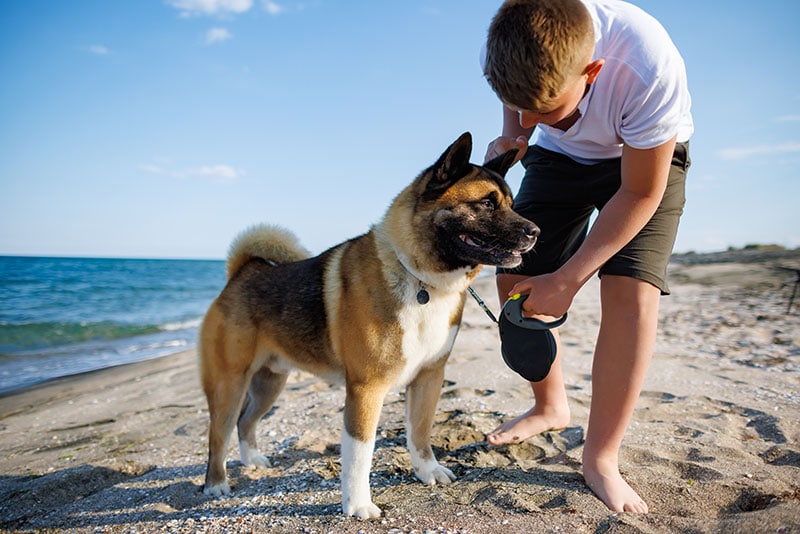
Socialization
Socialization is when you expose your dog to new places, people, animals, and other sights when they’re young. The ideal window for socializing your Akita is during puppyhood, specifically 4 to 16 weeks. During this brief but critical window of time, you should be bringing your Akita puppy on walks to new places, as well as introducing them to other people and dogs.
When socializing, positive reinforcement is very, very useful and helps form lasting positive associations with things, sort of like a human’s first impression. An example is if your dog is barking at cats or other dogs, you ignore their barking or leash tugging until they’re calm and then give them plenty of praise and a treat. By repeating this, you tell them that there’s no reward for the bad behavior, and that’s really at the core of all socialization and dog training. It’s just that all this is more important with Akitas due to their bad habit of becoming aggressive if poorly socialized or not being trained properly.
Reach out to animal behaviorist or a veterinarian if you would ever run into any issues with your Shiba Inu.
PangoVet. It’s an online service where you can <b>talk to a vet online</b> and get the personalized advice you need for your pet — all at an affordable price!</p>
<p><div class="su-button-center"><a href=https://www.dogster.com/lifestyle/"https://pangovet.com/?utm_source=dogster&utm_medium=article&utm_campaign=dog_behavior_training%22 class="su-button su-button-style-default" style="color:#FFFFFF;background-color:#FF6600;border-color:#cc5200;border-radius:9px;-moz-border-radius:9px;-webkit-border-radius:9px" target="_blank" rel="nofollow"><span style="color:#FFFFFF;padding:0px 24px;font-size:18px;line-height:36px;border-color:#ff944d;border-radius:9px;-moz-border-radius:9px;-webkit-border-radius:9px;text-shadow:none;-moz-text-shadow:none;-webkit-text-shadow:none"> Click to Speak With a Vet</span></a></div></div></div></p>"}" data-sheets-userformat="{"2":513,"3":{"1":0},"12":0}" data-sheets-validation-definition="{"1":{"1":{"1":23,"2":[{"1":1,"3":{"1":{"1":[{"1":4,"6":1},{"1":1,"2":"="}]},"2":{"1":[{"1":2,"2":"="},{"1":3,"3":1}]},"3":"R1]S"},"4":[{"1":{"1":1,"2":21,"3":0,"4":1,"5":2236944,"6":"841046713"},"2":1}]}],"6":[{"1":{"2":{"1":2,"2":"🍎 Ate or drank"}},"2":{"1":2,"2":676776},"3":{"1":2,"2":12574966}},{"1":{"2":{"1":2,"2":"❤️ Preventative wellness"}},"2":{"1":2,"2":676776},"3":{"1":2,"2":12574966}},{"1":{"2":{"1":2,"2":"🩺 Other"}},"2":{"1":2,"2":676776},"3":{"1":2,"2":12574966}},{"1":{"2":{"1":2,"2":"⚠️ Urinary problems"}},"2":{"1":2,"2":676776},"3":{"1":2,"2":12574966}},{"1":{"2":{"1":2,"2":"👁️ Eye issues"}},"2":{"1":2,"2":676776},"3":{"1":2,"2":12574966}},{"1":{"2":{"1":2,"2":"🛡️ Flea & tick"}},"2":{"1":2,"2":676776},"3":{"1":2,"2":12574966}},{"1":{"2":{"1":2,"2":"🤮 Vomiting"}},"2":{"1":2,"2":676776},"3":{"1":2,"2":12574966}},{"1":{"2":{"1":2,"2":"🐕 Behavior & training"}},"2":{"1":2,"2":676776},"3":{"1":2,"2":12574966}}]},"2":{"1":{"1":[{"1":4,"6":0},{"1":4,"6":1},{"1":2,"3":"CONDITION_ONE_OF_RANGE","4":2},{"1":1,"2":"="}]},"3":"R0]R1]FCONDITION_ONE_OF_RANGE:2]S"},"3":[{"1":{"1":0,"2":1,"3":0,"4":1,"5":1118464},"2":0},{"1":{"1":1,"2":21,"3":0,"4":1,"5":2236944,"6":"841046713"},"2":1}]},"2":"","3":1,"4":1,"6":0}" data-sheets-validation-id="0"> If you need to speak with a vet but can’t get to one, head over to PangoVet. It’s an online service where you can talk to a vet online and get the personalized advice you need for your pet — all at an affordable price!
In Conclusion
With their luxuriously fluffy, erect ears, bold personality, and imposing stature, the Akita is a natural guard dog. They’re alert and unwaveringly loyal but need firm training and ample socialization to become a more mellow house dog. Don’t worry, though! They’ll still be good guard dogs, just more well-behaved!
Related Reads:
- Is an Akita Good With Kids? Tips, Temperament & FAQ
- Is an Akita Good With Cats? History, Facts & FAQ
Featured Image Credit: IVASHstudio, Shutterstock

